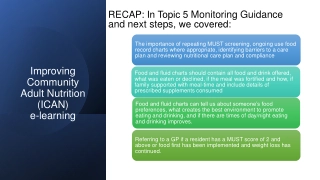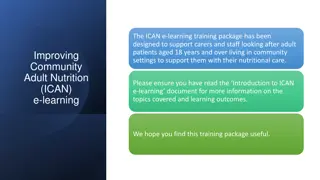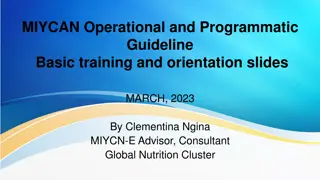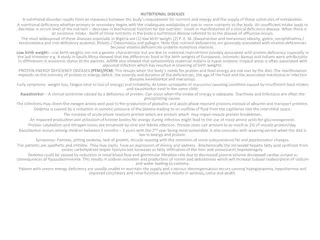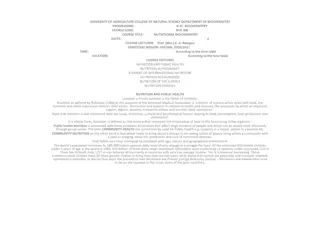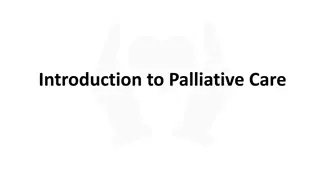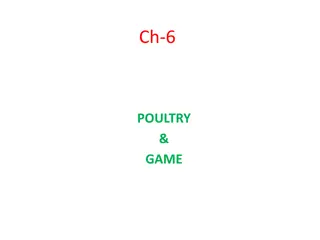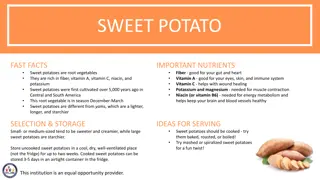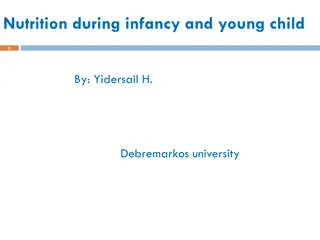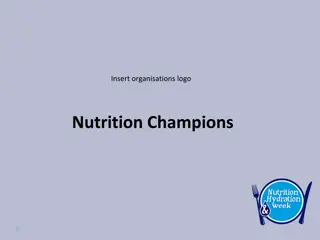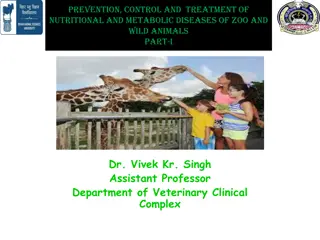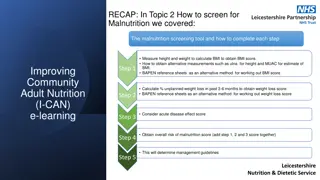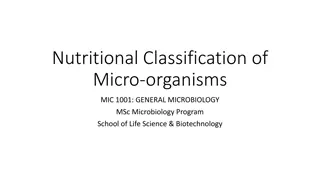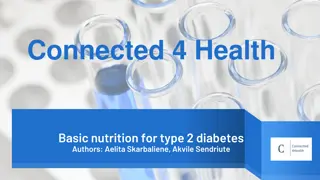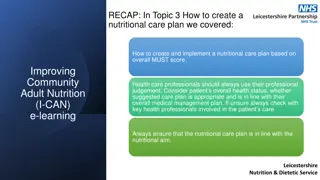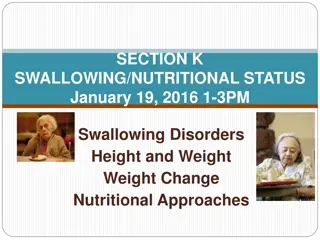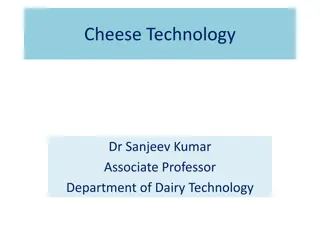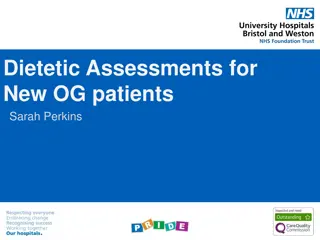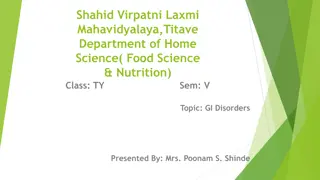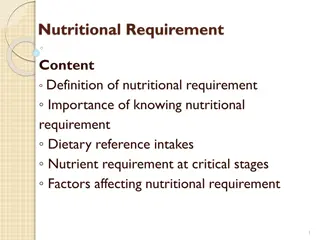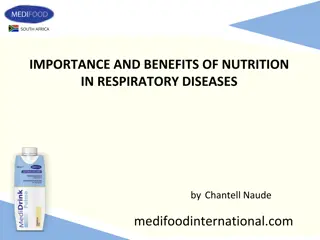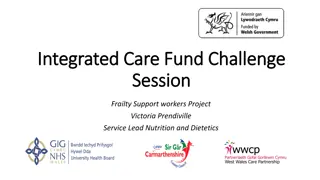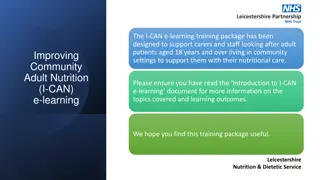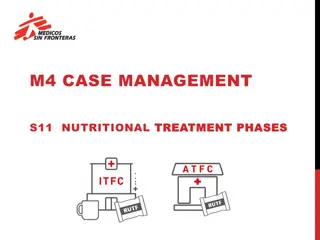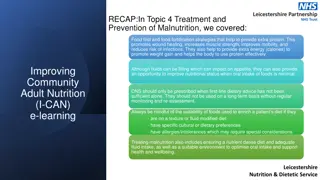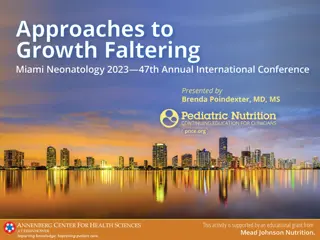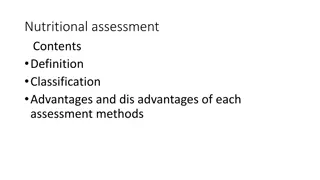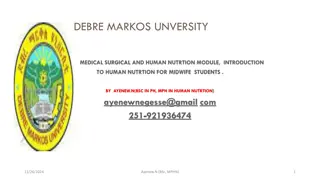Importance of Monitoring Guidance in Nutritional Care
This recap covers the significance of regular screening, using food record charts, identifying barriers to care plans, and reviewing nutritional compliance. It emphasizes the ICAN e-learning module and the key factors influencing nutritional care. The content highlights the importance of adequate fl
0 views • 16 slides
Strategies for Managing Malnutrition with Nutritional Care Plans
Understanding how to create and implement a nutritional care plan based on the MUST score, including strategies like Food First and Fortification, can help manage malnutrition effectively. This involves utilizing nutrient-dense foods, promoting wound healing, increasing muscle strength, and improvin
0 views • 18 slides
Nutritional Care Planning for Malnutrition Screening
Learn how to screen for malnutrition using tools like BMI calculation and weight loss assessment. Understand the steps to create a nutritional care plan based on MUST scores, including setting aims, implementing agreed plans, and monitoring progress. Gain insights into managing malnutrition risks an
1 views • 12 slides
Exploring the Health Benefits and Nutritional Value of Crunchy Almond Butter
Crunchy almond butter has emerged as a popular and nutritious alternative to traditional spreads. Made from ground almonds, this creamy yet textured delight offers a myriad of health benefits and is a versatile addition to any diet. In this blog post, we delve into the nutritional profile and explor
0 views • 4 slides
Supporting Adult Nutrition in Community Settings - ICAN E-Learning Training
The ICAN E-Learning Training Package is designed to assist carers and staff caring for adult patients aged 18 and over in community settings with their nutritional care. The training covers topics such as national standards in nutrition, defining malnutrition, causes and consequences of malnutrition
7 views • 10 slides
Multidisciplinary Approach to Bariatric Surgery: Case Study and Interventions
This case study involves a patient with severe obesity and comorbidities preparing for bariatric surgery. The medical history includes type 2 diabetes and significant obstructive sleep apnea, leading to a reduced quality of life. The patient's psychosocial assessment highlights the importance of psy
4 views • 7 slides
Quick MD Care_ Your Trusted Partner in Primary Care Medicine
Quick MD Care: Your Trusted Partner in Primary Care Medicine\n\nWelcome to Quick MD Care, where compassionate primary care meets convenience. We understand the importance of having a trusted partner in managing your health. Our team of dedicated primary care doctors is committed to providing persona
5 views • 2 slides
Improving Maternal and Child Nutrition in Somalia: Challenges and Solutions
Addressing the nutritional challenges faced by women and children in Somalia, including high rates of anemia, inadequate breastfeeding practices, and malnutrition. Factors contributing to malnutrition such as poor diets, limited access to essential services, and gender inequalities are highlighted.
0 views • 12 slides
Germany Nutritional Supplements Market
The Germany Nutritional Supplements Market Size is Anticipated to Exceed USD 9.66 Billion by 2033, growing at a CAGR of 6.55% from 2023 to 2033.
0 views • 4 slides
Overview of Nutritional Diseases and Disorders
Nutritional diseases arise from imbalances between the body's nutrient and energy requirements and their supply. Nutritional deficiencies can lead to clinical diseases, while excessive intake can result in diseases of affluence. Common nutritional disorders include low birth weight, PEM, obesity, go
4 views • 6 slides
Understanding Nutritional Biochemistry: A Comprehensive Overview of Nutrition and Public Health
Nutrition, as defined by Robinson, explores the relationship between food and the human body's functioning. This course delves into key topics such as nutrition in pregnancy, childhood, and the elderly, as well as nutrition-related diseases. It emphasizes the importance of public health nutrition in
1 views • 7 slides
Understanding Palliative Care: Enhancing Quality of Life in Serious Illness
Palliative care is a holistic approach focused on improving the quality of life for patients and their families dealing with life-threatening illnesses. It involves early identification, assessment, and treatment of pain and other physical, emotional, and spiritual issues. This comprehensive trainin
0 views • 60 slides
Understanding Poultry and Game: Types, Cooking Tips, and Nutritional Benefits
Poultry, including chicken, turkey, duck, goose, and guinea fowl, offers a leaner option compared to other meats, making it a healthy choice for various dishes. Game meat, sourced from animals hunted for food, provides a unique flavor profile and nutritional benefits. This article delves into the ty
0 views • 16 slides
Discover the Nutritional Benefits of Sweet Potatoes and Fun Activities to Explore
Explore the nutritional value of sweet potatoes, including fiber, vitamins, and minerals they offer. Learn interesting facts about their cultivation and ideal serving suggestions. Engage in exciting activities like a five senses exploration, poetry writing, and recipe invention centered around sweet
5 views • 5 slides
Infant Nutrition and Growth Development Overview
This informative content covers various aspects of infant nutrition and growth development, including breastfeeding, complementary feeding, and common nutritional problems. It also discusses assignments related to assessing nutritional status, harmful traditional practices, and the importance of neo
3 views • 61 slides
Nutrition Champions: Improving Nutritional Care in Health and Social Settings
Nutrition Champions play a vital role in promoting food and drink as essential components of care packages in various settings. Their goal is to enhance nutritional and hydration care, share best practices, facilitate behavior change, and improve access to healthy food and fluids. The content discus
1 views • 21 slides
Managing Nutritional and Metabolic Diseases in Zoo and Wild Animals
The prevention, control, and treatment of nutritional and metabolic diseases in zoo and wild animals are essential for maintaining their health. These diseases, such as rickets, osteoporosis, osteomalacia, and fibrous osteodystrophy, can result from imbalances in dietary nutrients and metabolic dera
0 views • 10 slides
Child Care and Youth Programs at Minot AFB
Offering a range of child care services including Child Development Center for ages 6 weeks to 5 years, School Age Care for Kindergarten to 12 years, Family Child Care Program, and Youth Programs for ages 9-18. Services include full-time care, before/after school care, extended duty care, emergency
1 views • 6 slides
Understanding Malnutrition Screening and Nutritional Care Planning
In this overview, discover the process of screening for malnutrition, including calculating BMI, assessing weight loss, and determining overall malnutrition risk. Explore how to create a nutritional care plan based on the MUST score and set appropriate nutritional aims for patients.
0 views • 12 slides
Nutritional Classification of Microorganisms in General Microbiology
Microorganisms are classified based on their nutritional requirements into autotrophs and heterotrophs. Autotrophs can utilize inorganic nutrients or light for energy, while heterotrophs require organic compounds. They are further categorized into four groups: photoautotrophs, photoheterotrophs, che
1 views • 5 slides
Enhancing Nutritional Security in SADC Communities through Sugar Fortification
Nutritional security is crucial for overall well-being, and this presentation explores the significant role of sugar fortification in improving micronutrient intake and combating malnutrition in SADC regions. Insights into the current status quo, strategies for enhancing micronutrient intake, and th
0 views • 15 slides
Child Care Challenges in Kentucky: The Child Care Cliff
Explore the landscape of child care in Kentucky, revealing the challenges families face with the Child Care Cliff. Discover statistics on child care centers, family child care homes, and the average cost of child care in Kentucky. Understand the importance of the Child Care Assistance Program (CCAP)
0 views • 18 slides
Nutritional Recommendations for Type 2 Diabetes Management
Regularity and consistency in diet are crucial for individuals with type 2 diabetes to maintain stable blood sugar levels. The new nutritional pyramid recommended by the Ministry of Health of the Republic of Lithuania emphasizes the importance of balanced nutritional choices for managing diabetes. N
0 views • 15 slides
Managing Malnutrition: Strategies and Nutritional Care Plans
Learn how to create and implement a nutritional care plan based on the MUST score, in line with the I-CAN approach for treating malnutrition. Discover the importance of Food First and Fortification strategies, including tips for increasing food intake and promoting overall health and wellbeing.
0 views • 18 slides
Understanding Section K: Swallowing and Nutritional Status Assessment
Section K assesses conditions impacting residents' nutrition and hydration. It covers swallowing disorders, weight changes, and nutritional approaches. Proper coding and care planning are essential for accurate assessment. The section includes evaluation of swallowing difficulties, weight measuremen
0 views • 26 slides
Understanding Cheese: Technology, Classification, Legal Standards, and Nutritional Value
Dive into the world of cheese with insights on its technology, definitions, classification, legal standards, and nutritional composition. Discover how cheese is made, categorized, regulated, and its key nutritional components.
0 views • 16 slides
Optimizing Nutritional Support for Upper GI Cancer Patients: Insights and Strategies
High prevalence of malnutrition in upper GI cancer patients highlights the importance of early nutritional screening and intervention. The role of prehab clinics in enhancing outcomes is gaining momentum. Insights from previous experience in nutritional screening reveal both advantages and challenge
2 views • 15 slides
Understanding Peptic Ulcers: Causes, Symptoms, and Nutritional Management
Shahid Virpatni Laxmi Mahavidyalaya conducted a presentation on gastrointestinal (GI) disorders, focusing on peptic ulcers. The content covers the etiology, symptoms, and nutritional management of peptic ulcers, emphasizing the importance of proper diet in managing this condition. Peptic ulcers, cha
0 views • 8 slides
Impacts of Marketisation on Home Care for Older People in Urban China
This study by Wenjing Zhang from the University of Bristol delves into the effects of the marketisation process on home care for the elderly in urban China. It explores the rationale behind the marketisation of care, the trends in home care marketisation, and the processes involved. The background s
0 views • 19 slides
Understanding Nutritional Requirements and Their Impact
Exploring the definition and importance of nutritional requirements, as well as the Dietary Reference Intakes, critical stages for nutrient needs, and factors influencing nutritional requirements.
0 views • 174 slides
Importance and Benefits of Nutrition in Respiratory Diseases
Nutrition plays a crucial role in respiratory diseases such as COPD and CF, with malnutrition affecting a significant percentage of patients. Poor nutritional status is linked to increased morbidity and mortality in these patients, impacting pulmonary health and muscle function. MediDrink Pulmo offe
0 views • 7 slides
Improving Patient Outcomes through Frailty Support Project
This project, funded by the Carmarthenshire Intermediate Care Fund, aimed to provide flexible, person-centered care to support patient mobility and nutritional needs. Frailty workers implemented various strategies such as frailty snack boxes, daily frailty logs, grip strength assessments, and nutrit
0 views • 8 slides
Understanding Malnutrition in Adult Patients: I-CAN e-Learning Training Package
The I-CAN e-learning training package is designed to support carers and staff in community settings looking after adult patients aged 18 and over with their nutritional care. It covers topics such as national standards in nutrition, defining a balanced diet, causes and consequences of malnutrition,
0 views • 10 slides
Understanding Nutritional Treatment Phases in Pediatric Malnutrition
This session covers the different phases of nutritional treatment in pediatric malnutrition programs, focusing on objectives, specifics, and criteria for transitioning between phases. An illustrative case of Annika, a 3-year-old in the Transition Phase, is provided for practical application and unde
0 views • 5 slides
Manage Nutritional Care Plans Effectively: Monitoring and Strategies
Explore the key strategies for treating and preventing malnutrition, including food fortification and energy promotion. Learn about tools like food and fluid record charts, along with monitoring guidance for effective patient care. Understand the importance of consistent monitoring and addressing po
0 views • 10 slides
Understanding Subacute Care: Types of Residents and Care Settings
Subacute care involves providing specialized care for individuals who require more attention than what typical long-term care facilities can offer. This level of care is provided in settings like hospitals or certain units within long-term care facilities. Residents in subacute care settings need a
0 views • 62 slides
Neonatal Nutrition: Growth, Nutritional Support, and Management Phases
Neonatal nutrition, specifically focusing on growth faltering and early nutritional support, is crucial for the well-being of premature infants. Understanding growth rates and providing appropriate nutrients are key goals. Target growth rates and reference growth curves are important considerations.
0 views • 28 slides
Understanding Nutritional Assessment Methods
Nutritional assessment involves evaluating the nutritional status of individuals through various methods such as anthropometry, biophysical assessments, clinical evaluations, and dietary analysis. Anthropometric measurements, such as weight and recumbent length, play a crucial role in assessing grow
0 views • 48 slides
Understanding Food and Nutritional Toxicology
Food and nutritional toxicology delve into the science of poisons, toxins, and toxicants found in food. It covers substances harmful to consumers, including natural toxicants, contaminants, and additives. Nutritional toxicology focuses on the overlap between nutrition and toxicology, exploring the i
0 views • 17 slides
Introduction to Human Nutrition for Midwife Students at Debre Markos University
This course on Human Nutrition addresses the importance of maintaining health and preventing diseases through proper nutrition. It covers topics such as nutrient impact on health, nutritional problems, assessment methods, intervention approaches, and surveillance. Upon completion, students will be e
0 views • 100 slides
